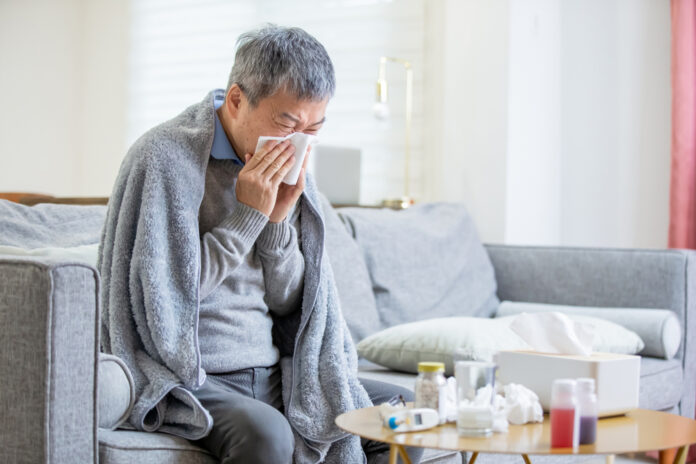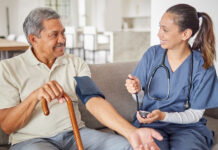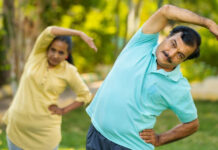For most of us, winters happen to be the most wonderful time of the year with Christmas and New Year festivities and family reunions. After all, all of us look forward to spending time within our cozy abodes celebrating with our near and dear ones, isn’t it? However, the cold weather and the icy climate prevailing in winter expose our beloved senior citizens to several weather-related illnesses posing a significant threat to their well-being. Therefore, fitness during winter through proper lifestyle habits and preventive measures plays a crucial role in keeping several ailments at bay.
Additionally, the fragile bodies of elders coupled with the compromised immune system and delicate skin make elders fall prey easily to various infectious attacks and diseases especially from flu or influenza. So, extra caution must be excised for flu-winter protection. The role of home nursing services cannot be undermined in this context as most elders need some form of external assistance and care support. Athulya Homecare, an extremely popular choice of geriatric home care services is known for its relentless efforts, holistic approaches, and dedicated services in senior care.
Let us now explore the winter risks for the elderly and ways to mitigate them.
Common Health Issues
- Flu: Flu is the most common ailment. It is characterized by cold, fever, shivering, exhaustion, congestion, sore throat, cough and chest congestion. It can lead to complications like pneumonia.
- Dehydration: Older people are more likely to get dehydrated faster. Typical signs of dehydration include dry mouth, headache, dizziness, decreased urine output and constipation causing poor replenishment of essential body fluids.
- Skin Problems: Dry skin can lead to cracks, bruises, and itching. This is because of decreased humidity in the surrounding atmosphere. Persistent symptoms should not be ignored as they result in serious skin infections.
- Frostbites: Extremely cold weather can not only hamper the skin but also the underlying bones by causing frostbites. Usual signs include numbness, waxy skin and greyish or yellow skin colouration. The body parts normally affected by frostbites include chins, fingers, toes, chin, cheeks, nose and cheeks.
- Hypothermia: This happens when the body temperatures fall below the normal values. Indications include pale skin, tiredness, mental confusion, reduced pulse rate and difficulty in movement. This condition should not be neglected as it can lead to acute respiratory disorders, kidney and liver damage, or even heart failure.
- Injuries due to Falls: Snow and ice-laden pathways and parking spaces make elders more susceptible to falls leading to injuries, fractures, and sadly even permanent impairments.
Other Winter Risks
- Indoor fires and electric hazards are more likely in the cold season due to the usage of fireplaces and heaters.
- Seniors may also suffer from carbon monoxide poisoning as most of the heating appliances are fuel-powered and there may be poor ventilation at home.
- Roadways covered with snow and ice can be risky for elders as there is a risk of skidding and tripping leading to falls and accidents.
Winter Safety Tips
- Wear appropriate woollen clothing and thermals to avoid hypothermia.
- Use moisturizers to safeguard the skin.
- Drink sufficient water and healthy beverages to keep the body well-hydrated.
- Ensure that all the electric and fuel-powered appliances are working properly and install smoke detectors at home to avoid hazards.
- There should be proper ventilation at home to prevent suffocation.
- Stock up all essentials including groceries and medicines so that you need not step out often in the cold weather.
- Be physically active and exercise regularly.
- Set the room heaters to the correct temperature so that the indoors are warm.
- Consume healthy foods to boost energy and retain body fat like fibre-enriched carbohydrates, fresh fruits and vegetables, nuts and seeds, energy bars, smoothies and soups.
- Some of the foods to avoid in winter include sugar-laden items, processed foods, caffeinated drinks, fried snacks and fatty dairy products.
- Wear boots and shoes with anti-skid soles when you venture out.
- Clear the snow deposits on the walking paths, steps and parking lots.
- Equip the car with anti-freeze shields, windshield wipers, and good-quality tyres.
- Carry an emergency kit with food, first aid kits, warm blankets, medications and enough water if you travel long distances.
- Take the flu vaccination periodically.
Frequently Asked Questions (FAQs)
- Name some illnesses which cannot keep the body warm during winters
Diabetes, Parkinson’s Disease, Arthritis, Memory Loss and Thyroid Disorders.
- What percentage of flu-related deaths are attributed to seniors?
Nearly seventy to eighty-five percent of flu-related deaths occur in the senior population.
- What are the advanced symptoms of hypothermia?
Shallow breathing, reduced consciousness, lowered heartbeat, extreme difficulty in walking.
- Suggest medications that reduce the severity of seasonal flu.
Anti-viral medications prescribed within forty-eight hours of first flu symptoms.
Thus, simple proactive steps and precautions can reduce risks and indeed make winters enjoyable for elders! Please connect with Athulya Homecare to know more.













